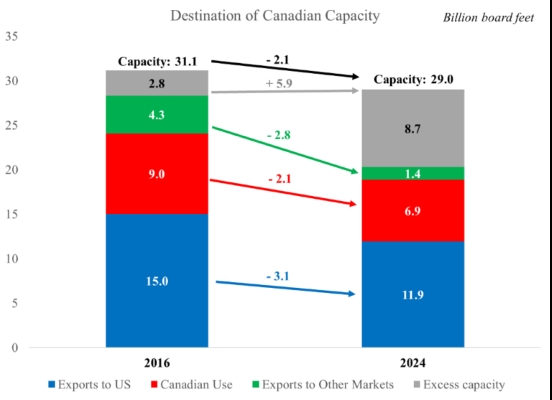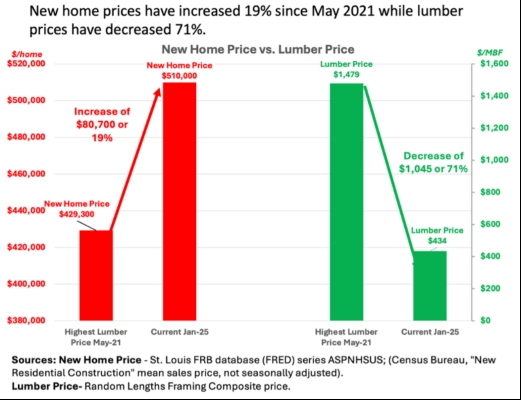Canadian Excess Lumber Capacity at the Root of Unfair Trade Practices

Since 2016, Canada’s excess lumber capacity has surged threefold to 8.7 billion board feet and is not sustainable. With non-U.S.A.-bound Canadian softwood lumber exports plunging, the Canadian industry is directing its excess lumber capacity and production to the U.S. market. The impact on U.S. lumber producers, workers, and forestry dependent communities has been devastating as Canada unloads this excess capacity into the U.S. market by engaging in egregious dumping and unfair trading practices. See White Paper at https://uslumbercoalition.org/resource/white-paper-cana…-not-sustainable/
“British Columbia Premier Eby’s claim that U.S. trade law enforcement is an attack on Canadian workers is entirely backwards,” stated Zoltan van Heyningen, Executive Director of the U.S. Lumber Coalition. “Canadian violations of U.S. trade laws are an attack on U.S. workers, U.S. companies, and President Trump’s goals to further increase U.S. lumber production.”
“Canadian softwood lumber producers dump their massive and ever-growing excess lumber production into the U.S. market on a daily basis while their provincial and federal governments make one new subsidy announcement after the other, and then complain about being subject to U.S. trade laws,” said van Heyningen.
“Canada and their U.S. allies, the National Association of Home Builders (NAHB) and their affiliated organizations, are engaged in a massive misinformation campaign trying to scare the American public into accepting Canada’s unfair trade practices,” added van Heyningen. “Canada’s fake concern for U.S. consumers in order to lobby for a pass on their unfair trade practices that suppress U.S. production of softwood lumber and kills U.S. jobs. It also flies in the face of Canada’s stated own housing affordability problem where softwood lumber does not appear to be either a problem or solution to housing affordability issues.”
“Why are Canada and the NAHB pushing the theme that softwood lumber is at the center of housing affordability concerns in the United States while the Canadian Prime Minister’s housing plan barely makes mention of lumber?” asked van Heyningen. https://liberal.ca/liberal-housing-plan-will-build-more-homes-using-canadian-lumber/
“Let’s face it, Canada does not care about the U.S. consumer. They just want to export their massive excess capacity lumber to the United States. And NAHB is not in the affordable home building business. When it comes to softwood lumber, both just want to maintain Canada’s market share in the United States using dumped and subsidized lumber imports at the expense of U.S. workers and their families,” said van Heyningen.
Even Canadian lumber companies agree with the U.S. Lumber Coalition that softwood lumber is not a driver of housing prices, hence not a problem for nor a solution to the housing affordability issue. See page 21 at https://www.westfraser.com/sites/default/files/presentations/pdfs/WFG%20-%20Q4%202024%20Investor%20Presentation%20-%20vFINAL2.pdf
“Let’s be clear, Canadian companies pay the duties imposed at the border on softwood lumber imports, not the U.S. consumer or U.S. taxpayer,” stated van Heyningen. ”All you have to do is go to the financial disclosures of any major Canadian lumber producer to see in detail how much they, not U.S. taxpayers, paid in antidumping and countervailing duties.” For example: https://www.newswire.ca/news-releases/canfor-reports-results-for-the-fourth-quarter-of-2024-851741629.html
“For Canada to express ‘concern’ about the consequences imposed on them because of their harmful and egregious unfair trade practices that have once again been documented by the U.S. Department of Commerce, and correctly have resulted in higher antidumping and anti-subsidy deposit rate duties is simply astounding,” stated Andrew Miller, Chair/Owner of Stimson Lumber Company.
“The United States applies its trade laws much the same way that Canada does, Canada complaining about being subject to U.S. trade laws when Canadian lumber companies engage in unfair trade practices, is disingenuous” added Miller. See extensive list of Canadian border measures at https://www.cbsa-asfc.gc.ca/sima-lmsi/mif-mev/menu-eng.html.
“If Canada does not like being subject to antidumping and countervailing duties then all Canada and Canadian companies have to do is to stop engaging in harmful unfair trade practices. It’s that simple,” stated Miller.
“Canada should stop dumping their softwood lumber into the U.S. market, stop rolling out new subsidies, and stop calling for even more subsidies to prop up their industry instead of complaining about being subject to the U.S. trade laws. This is not a game. Real U.S. jobs are on the line. The stability of our domestic softwood lumber supply chain is on the line. My workers’ jobs are on the line. We will continue to fight to maintain these American jobs in the face of unfair trade and to grow our industry to its full potential,” concluded Miller.
About the U.S. Lumber Coalition
The U.S. Lumber Coalition is an alliance of large and small softwood lumber producers from around the country, joined by their employees, and woodland owners, working to address Canada’s unfair lumber trade practices. Our goal is to serve as the voice of the American lumber community, and effectively address Canada’s unfair softwood lumber trade practices, including its gross underpricing of timber. For more information, please visit the Coalition’s website at www.uslumbercoalition.org.
Contact:
Zoltan van Heyningen – Media Contact – zoltan@uslumbercoalition.org – (202) 805-9133
Source: The U.S. Lumber Coalition



